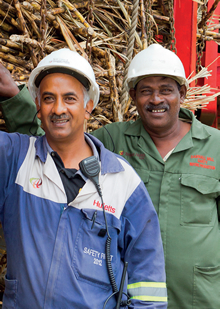PRODUCT RESPONSIBILITY
 |
| Increasing sugar cane supplies to Tongaat Hulett |
Business Approach
Tongaat Hulett participates in a number of initiatives that promote product responsibility in agri-processing and land development. Product safety and quality assurance are embedded in the business’s core values and the company’s systems facilitate the commitment to not compromise on the safety of its products.
Customer Health and Safety
The company complies with all relevant safety, health, environmental and quality legislation in each of the countries of operation as well as striving for implementation of industry best practice. The production facilities have been certified under the ISO 9001:2008 quality management system. In South Africa, the operation, has adopted the Hazard Analysis and Critical Control Point (HACCP). Downstream products supplied to the pharmaceutical industry are required to meet the Food and Drugs Act standards.
Product and Service Labeling
Tongaat Hulett ensures that appropriate information is provided to its customers. All products carry product labels describing information about the product, in compliance with the respective country legislation and labeling regulations. In addition to protecting Tongaat Hulett products, labeling informs consumers about the product’s nutritional composition and ingredients.
Marketing Products Responsibly
The business seeks to grow its market share in a responsible manner. Consequently the marketing of its product range is not aimed at misleading the public about any potential health or other risks related to products produced by Tongaat Hulett. The company’s objective is to grow its market share through product innovation and the production of high quality products.
Supply Chain Sustainability
Tongaat Hulett is developing a green procurement policy framework, with a view to optimising resource usage, increasing its product value and reducing its product carbon footprint and other negative environmental impacts. This is being achieved by collaborating with suppliers and customers throughout the value chain, to identify opportunities for adopting innovative technologies, products and business solutions with definitive potential for reducing environmental and climate change impacts, enhancing the safety and health of employees and communities, as well as reducing operational costs.
Special attention is being given to packaging products, energy and water management, as well as industrial and agricultural chemicals. Robust initiatives are being developed to ensure alignment with critical activities involving procurement, transportation and logistics, storage, usage and disposal of sensitive products. Some of the key themes in this process include:
- Focus on the total product life cycle impacts in the context of individuals and communities
- Use of renewable resources including recycled products and extended life cycles
- Encouraging use of eco-friendly products and use of transportation methods with minimum environmental impacts
- Asset and resource optimisation initiatives, including emphasis on usage efficiencies, inventory and waste management
- Increased research efforts into water conservation technologies and lean and clean production techniques.
 |
| Development at Kindlewood Estate |




